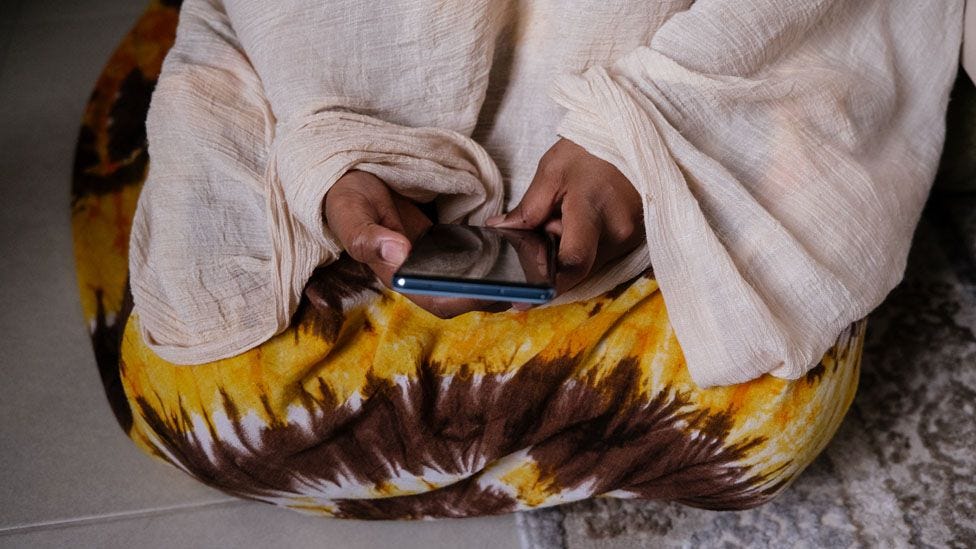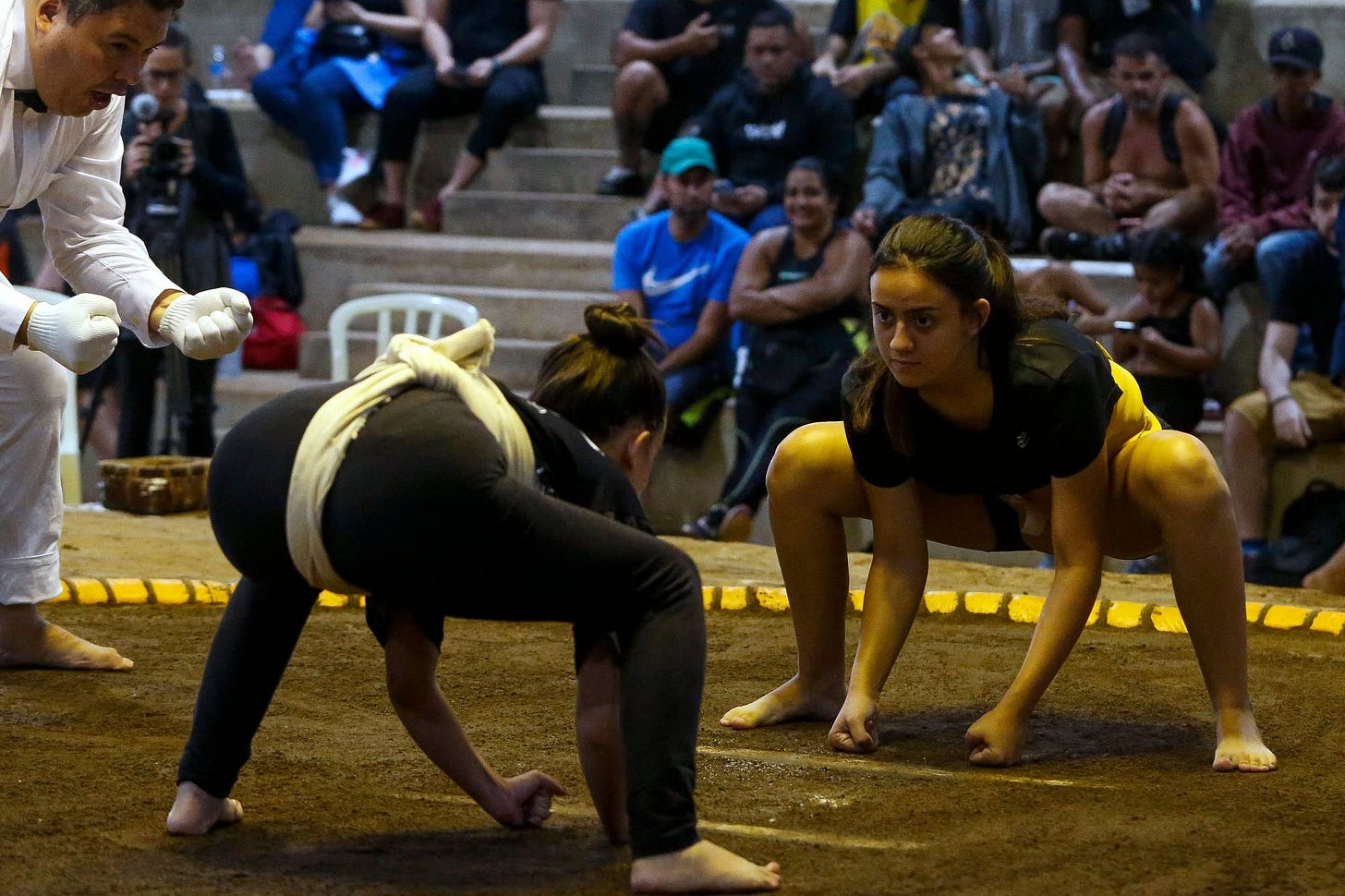Global Roundup: Uganda LGBTQ Rights Activist, Somalia Sex Workers, Japan LGBTQ Rights, Representing First Nations Women in Jiu-Jitsu, Brazil Women Sumo Wrestlers
Curated by FG Contributor Samiha Hossain
Kasha Jaqueline Nabagesera n the cover of Time magazine’s Europe edition in 2015
Uganda's parliament passed the new bill on Tuesday with a near-unanimous majority, making it a crime to identify as LGBTQ, and handing authorities broad powers to target gay Ugandans who already face legal discrimination and mob violence. It includes steep sentences of life in prison for having same-sex relations, and the death sentence for "aggravated homosexuality," which is described in the law as same-sex relations with people under the age of 18 or when the individual is HIV positive.
Nabagesera founded Freedom and Roam Uganda 20 years ago, one of the main organizations for lesbian, bisexual and transgender women rights in Uganda. She has won international awards for her activism, works for the Kuchu Times Media Group and publishes Bombastic magazine, an LGBTQ-focused publication she says showcases the "lived realities" of people in her community — and aims to change the mindset of Ugandans. She believes the new legislation serves to distract Ugandans from other issues in the country.
…It's like they all organized themselves to come and disrupt the country, because right now no one is talking about all the problems the country is facing. Everyone is talking about homosexuality. -Kasha Jacqueline Nabagesera
Nabagesera says she has been the target of online hate, attacked in public back home and received death threats. She worries about the safety of the people she loves. Watching it all unfold when she is thousands of kilometres away has been difficult for her, however, she plans on going back to Uganda.
What is the use of me starting something and I stop halfway? So I'll go back and be with my community and we shall get through this. We've been here before. And so there's no reason why we shouldn't continue to fight. -Kasha Jacqueline Nabagesera
Some sex workers, like Fardousa, now use their phones to be in touch with clients rather than risk making contact in a dangerous place (model used in the picture) Photo by LEYLA JEYTE
Two women in Somalia's capital, Mogadishu, have been talking to the BBC about being sex workers in a city living under the threat of violence following years of civil war. Their real names have been changed.
Fardousa, 22, left home at 19 due to her abusive stepmother. She eventually became addicted to opioids and joined the underground party scene at Lido Beach, where she was introduced to sex work. She soon found herself enmeshed in Mogadishu's murky underworld where she went from hotels to strangers' homes to secluded locations.
These men at first were male friends of my female friends, then it changed to having sex with different men that I didn't know. I was vulnerable and needed the money for my addiction, just like many other young women in this city. -Fardousa
There is no official data on the extent of sex work but the testimony from Fardousa and others offers a glimpse into the dangerous environment that many of these young women find themselves in. Hodan has been a sex worker for two and a half years. Like Fardousa, the 23-year-old ran away from home and found herself immersed in Mogadishu's underground lifestyle consisting of fellow young runaways who have no financial support. As sex work is illegal in Somalia, many of these young women find themselves in precarious situations with no recourse to the authorities.
I spend most nights in hotels. The same goes for many of these young women. You meet all kinds of men there but things can take a turn for the worse when you actually go off with some of these men. -Hodan
Both Fardousa and Hodan talk about their experiences of violence on the job and how some of the assaults are filmed and used to blackmail women. Sex workers have to remain extra vigilant in order to protect themselves.
A UN report found that there was a big jump in sexual violence from 2019 to 2020, saying that abuse is often exacerbated in conflict zones. It also noted that "weak legislation allows perpetrators to walk free, and survivors receive little or no support.”
In Somalia, women like us have no support system in place and there's nobody you can turn to. The societal pressure makes everything worse, which is why so many of these vulnerable women are reluctant to get help, especially if they face problems with addiction. -Fardousa
Hodan and Fardousa emphasise that many women would not enter into such dangerous work if the mechanisms and organisations were in place to support them, often leading them to being trapped in a violent and exploitative lifestyle.
LGBTQ activists hold up cards showing a logo each of their newly founded a civil engagement group Pride7, or P7, for the upcoming Group of Seven Summit that Japan hosts in May, to make policy proposals, including a demand that Japan enact anti-discrimination law to guarantee equal rights for them, at a news conference at the Ministry of Health, Labor and Welfare in Tokyo Wednesday, March 22, 2023.(AP Photo/Mari Yamaguchi)
Japanese LGBTQ activists and rights groups have launched a civil “engagement group” to make policy proposals ahead of the Group of Seven summit in Japan and announced plans to hold an inaugural Pride 7 summit in Tokyo later this month, seeking to accelerate their efforts to get the Japanese government to adopt an anti-discrimination law. Japan is the only member of the Group of Seven advanced industrialized nations that lacks a law protecting the rights of LGBTQ people.
The Japan Alliance for LGBT Legislation, a local civil group, joined by two other organizations, on Wednesday announced the launch of Pride 7, which plans to make policy proposals for G-7 organizers in the hopes of achieving an LGBTQ anti-discrimination law in Japan while also addressing problems in other countries, especially in Asia.
LGBTQ activists and their supporters have stepped up their efforts to achieve an anti-discrimination law following discriminatory remarks in February by a former Kishida aide, who said he wouldn’t want to live next to LGBTQ people and that citizens would flee Japan if same-sex marriage were allowed. Amid national outrage over the remarks, Kishida's Liberal Democratic Party and other non-partisan lawmakers have begun preparing legislation to promote awareness of LGBTQ rights, but some conservatives have shown resistance.
Support for sexual diversity has grown slowly in Japan but legal protections are still lacking for lesbian, gay, bisexual and transgender people. They often face discrimination at school, work and at home, causing many to hide their sexual identities. In recent years, more than 200 local municipalities, including Tokyo, have introduced certificates of partnerships for same-sex couples allowing them to rent apartments and sign documents in medical emergencies, and for inheritance. Still, the certificates are not legally binding and same-sex couples are often barred from visiting each other in the hospital and from getting access to other services available to married couples.
Desiree Wescoup sits on the podium at the a Brazilian jiu-jitsu tournament in Los Angeles earlier this month. Wescoup, who now lives in Kelowna, B.C., but is originally from Opaskwayak Cree Nation, won three medals at the international tournament. (Submitted by Desiree Wescoup)
A 24-year-old Indigenous martial artist from Canada says while she is happy to be coming home from an international tournament with three medals, she is also proud to be one of the few Indigenous women competing in the sport of Brazilian jiu-jitsu. Desiree Wescoup, originally from Opaskwayak Cree Nation, took home three bronze medals at an international Brazilian jiu-jitsu tournament in Los Angeles earlier this month.
There's not a lot of Indigenous women in the sport itself. So just being able to be one of them, and to take it far as competing, especially in … different countries — that's, like, a huge reward. -Desiree Wescou
Amreek Aujla-Fieldt, Wescoup's coach, said he was very proud of what she and her teammates accomplished at the tournament. Wescoup's greatest strength is "her tenacity," her coach said. The coach also said Wescoup “fights hard” and “doesn’t give up.”
It was not until after her move to British Columbia that Wescoup took up Brazilian jiu-jitsu. It initially simply offered a way to get out and do something active, but she eventually fell in love with the sport — a self-defence martial art based on grappling and submission holds. Wescoup hopes to go to more tournaments and events in the future. Her goals include competing at this year's world championship in Long Beach, Calif., in June, and heading to Jiu-Jitsu Con — billed as "the world's biggest jiu-jitsu event" — in Las Vegas.
Diana Dall'Olio (right) and her mother Valeria (not pictured) hope to fight against perceptions that women can't participate in sumo. | AFP-JIJI
Valeria and Diana Dall’Olio, a mother-daughter sumo wrestling team from Brazil, are used to people saying they are too small, too fragile or too female to practice a sport typically associated with hulking Japanese men. But they say that is just fuel for their fighting spirit when they get in the ring.
Women are always under a microscope in the martial arts, because they’re sports that have generally been restricted to male fighters. -Valeria Dall’Olio, 39
Valeria got into martial arts as a girl, studying judo and jiu-jitsu. In 2016, she fell in love with sumo, which was brought to Brazil by Japanese immigrants in the early 20th century. Soon, she was winning bouts — all the way up to the Brazilian national title, which she won three times (2018, 2019 and 2021) in the middleweight category between 65 and 73 kilograms.
She added the South American championship to her trophy case in 2021.
Women are banned from professional sumo in Japan. In its birthplace, the highly ritualized sport has been linked for more than 1,500 years to the Shinto religion, whose believers have traditionally seen women as impure or bad luck for sumo. But an international amateur women’s sumo championship has been held since 2001. Organizers hope to one day turn it into an Olympic sport.
You can feel the prejudice. A lot of people say, ‘Women are fragile, they get injured and quit.’ That’s one of the things we’re learning to fight against. My generation is rising up. -Diana, 19
Sumo is growing fast in Brazil, mainly thanks to women, says Oscar Morio Tsuchiya, president of the Brazilian Sumo Confederation. Women make up around half the country’s 600 sumo wrestlers, he says.
Samiha Hossain (she/her) is a student at the University of Ottawa. She has experience working with survivors of sexual violence in her community, as well as conducting research on gender-based violence. A lot of her time is spent learning about and critically engaging with intersectional feminism, transformative justice and disability justice.
Samiha firmly believes in the power of connecting with people and listening to their stories to create solidarity and heal as a community. She refuses to let anyone thwart her imagination when it comes to envisioning a radically different future full of care webs, nurturance and collective liberation.






